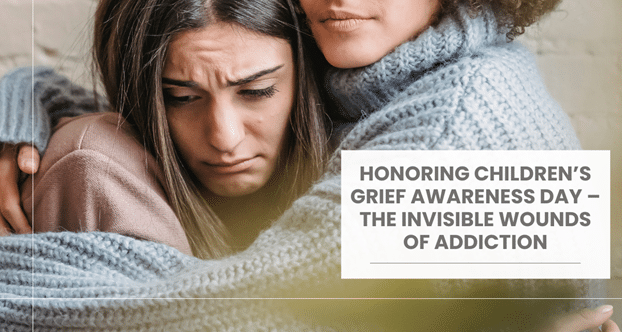Children’s Grief Awareness Day serves as a poignant reminder of the unique and often overlooked struggles faced by children impacted by loss. For children living in families affected by the chronic illness of addiction, the experience of grief is complex, multifaceted, and frequently ignored. Family members can die because of the substance use disorder (SUD), ramifications from co-existing issues such as depression, or death by suicide. These children bear an invisible burden, grieving not only the effects of the SUD on their loved ones but also the loss of stability, safety, and sometimes even their sense of self.
The First Hurt, The Last Helped
Children with family members struggling with a SUD are among the first to feel it’s devastating impact. They experience the chaos, neglect, and trauma that can accompany it within the family. Despite this, these children are often the last to receive support, acknowledgment, or help, if at all. The societal stigma surrounding addiction compounds their isolation, leaving many children to navigate these challenges without the compassionate interventions they need.
The disease of addiction is often framed as a moral failing rather than a treatable condition, leading to judgment and shame not only for those directly affected but also for their families. Children in these circumstances may internalize blame, feeling responsible for the turbulence in their home, or the reason their family member died. The stigma silences their stories and denies them the opportunity to express their grief or seek solace.
The Double Burden of Stigma, Silence and Disenfranchised Grief
When a death due to SUD occurs, the silence surrounding addiction stifles the grieving process. Children and families are often put down or have their grief minimized because of societal ignorance with comments like: “their parents are choosing to get drunk or high!” “your parents chose drugs and alcohol over their children!” or “your mom chose to take drugs and that’s why she died.” Kids may not feel safe discussing their pain, for fear of judgment or misunderstanding. When grief is not acknowledged, or disenfranchised, complications are more likely to surface. Lack of acknowledgment can lead to traumatic bereavement and unresolved grief, manifesting in emotional, social, or academic challenges.
Language and societal attitudes play a critical role in perpetuating the stigma that exacerbates the struggles of these children. Terms like “addict” or “junkie” distill individuals to being only the disease, fostering judgment rather than understanding. This labeling can extend to their families, isolating children and discouraging them from reaching out for help. As highlighted in resources like the Shatterproof Language Guide, person-first language—such as “person with a substance use disorder”—shifts the narrative, emphasizing dignity and humanity over shame.
Furthermore, helping children separate the disease from the family member they love is extremely supportive, and essential during times of grief. Talking about loved ones and sharing precious memories are an important part of the grieving process. There may be tender moments or treasured traditions that children hold dear, despite the addiction behaviors that plagued the family. Provide a safe space for them to honor the family member they love, as well as the disease that they hate.
Breaking the Silence: Creating a Supportive Environment
Children’s Grief Awareness Day is an opportunity to shed light on the experiences of these often-forgotten children. Here’s how we can help:
1. Be Truthful There is often a reluctance, even from well-meaning professionals, to frame the death in a different way when someone has died from substance use disorder. When the cause of death is hidden, stigma and confusion grow.
2. Acknowledge Their Grief Recognize that children impacted by SUD experience a unique form of grief that deserves attention and empathy.
3. Explore Grief Resources NACoA provides Support for Grieving COAs, a list of helpful resources to help caring adults support children impacted by the disease of addiction as they grieve.
4. Foster Open Conversations Create safe spaces for children to share their feelings without fear of judgment. Language matters—use terms that validate their experiences without reinforcing stigma.
5. Provide Access to Support Resources like NACoA’s Tools for Kids and Celebrating Families! offer resources designed to support children in processing their emotions and building resilience.
6. Challenge Stigma Educate communities about addiction as a disease, not a moral failing. Replace stigmatizing terms with compassionate, person-first language to create a more supportive environment.
On this Children’s Grief Awareness Day, let us commit to recognizing and addressing the grief of children affected by the often-destructive disease of addiction. These children, often the first hurt and last helped, need allies who will stand by them, ensuring their voices are heard and their needs met. By breaking down stigma, fostering compassion, and reminding them they are not alone, we can help them find healing, hope, and a path forward.
For more information about COAs and grief, read NACoA’s blog: OVERDOSE AND GRIEF: Children Need Our Support.
